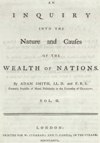The estimable Adam Smith, writing over two centuries ago. When you read the following passage, do you find (as I do) that Smith is describing many current public schools and state universities?
 “In other universities, the teacher is prohibited from receiving any honorary or fee from his pupils, and his salary constitutes the whole of the revenue which he derives from his office. His interest is, in this case, set as directly in opposition to his duty as it is possible to set it. It is the interest of every man to live as much at his ease as he can; and if his emoluments are to be precisely the same, whether he does or does not perform some very laborious duty, it is certainly his interest, at least as interest is vulgarly understood, either to neglect it altogether, or, if he is subject to some authority which will not suffer him to do this, to perform it in as careless and slovenly a manner as that authority will permit. If he is naturally active and a lover of labour, it is his interest to employ that activity in any way from which he can derive some advantage, rather than in the performance of his duty, from which he can derive none.
“In other universities, the teacher is prohibited from receiving any honorary or fee from his pupils, and his salary constitutes the whole of the revenue which he derives from his office. His interest is, in this case, set as directly in opposition to his duty as it is possible to set it. It is the interest of every man to live as much at his ease as he can; and if his emoluments are to be precisely the same, whether he does or does not perform some very laborious duty, it is certainly his interest, at least as interest is vulgarly understood, either to neglect it altogether, or, if he is subject to some authority which will not suffer him to do this, to perform it in as careless and slovenly a manner as that authority will permit. If he is naturally active and a lover of labour, it is his interest to employ that activity in any way from which he can derive some advantage, rather than in the performance of his duty, from which he can derive none.
“If the authority to which he is subject resides in the body corporate, the college, or university, of which he himself is a member, and in which the greater part of the other members are, like himself, persons who either are, or ought to be teachers, they are likely to make a common cause, to be all very indulgent to one another, and every man to consent that his neighbour may neglect his duty, provided he himself is allowed to neglect his own. In the university of Oxford, the greater part of the public professors have, for these many years, given up altogether even the pretence of teaching.
“If the authority to which he is subject resides, not so much in the body corporate, of which he is a member, as in some other extraneous persons, in the bishop of the diocese, for example, in the governor of the province, or, perhaps, in some minister of state, it is not, indeed, in this case, very likely that he will be suffered to neglect his duty altogether. All that such superiors, however, can force him to do, is to attend upon his pupils a certain number of hours, that is, to give a certain number of lectures in the week, or in the year. What those lectures shall be, must still depend upon the diligence of the teacher; and that diligence is likely to be proportioned to the motives which he has for exerting it. An extraneous jurisdiction of this kind, besides, is liable to be exercised both ignorantly and capriciously. In its nature, it is arbitrary and discretionary; and the persons who exercise it, neither attending upon the lectures of the teacher themselves, nor perhaps understanding the sciences which it is his business to teach, are seldom capable of exercising it with judgment.”
 From: Adam Smith, AN INQUIRY INTO THE NATURE AND CAUSES OF THE WEALTH OF NATIONS (1776).
From: Adam Smith, AN INQUIRY INTO THE NATURE AND CAUSES OF THE WEALTH OF NATIONS (1776).
BOOK V. OF THE REVENUE OF THE SOVEREIGN OR COMMONWEALTH.
CHAPTER I. OF THE EXPENSES OF THE SOVEREIGN OR COMMONWEALTH.
PART III. Of the Expense of public Works and public Institutions.
ART. II.—Of the Expense of the Institution for the Education of Youth.